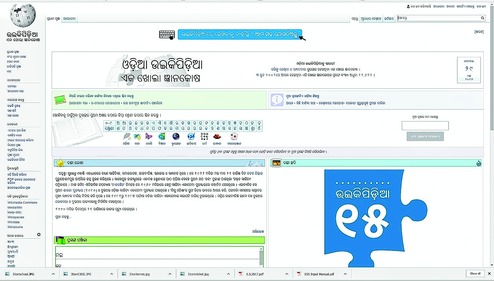
Bhubaneswar, May 30: The Odia Wikimedia community, a global movement whose mission is to bring free educational content to the world, has initiated a number of steps to ensure the growth of Odia language online.
The community has released a new freely licensed converter that can convert the Odia text into International Phonetic Alphabet (IPA) and Romanisation, two major standards used globally for writing phonetic notations. This converter is the fifth one released by the community while the other four are already in use on Odia Wikipedia and Wikisource. A few years ago, until these converters were available, the Wikimedia community were struggling to convert massive amount of acquired e-books for Wikisource, and the Odia language media and social media users were entirely dependent on legacy encoding standards.
"It was a tedious job, considering the fact much typing tools aren't available for these two formats and each words take at least five to six minutes. But with the release of this new converter, things have become far easier. It will help immensely those who need to use the phonetic formats, not only in Wikitionary, but in other research projects related to Odia language too," said Bikash Ranjan.
The community has also signed a letter of intent with the Bhubaneswar Development Authority.
As a part of it, the development authority will work with the Odia Wikimedia community on several projects, including the documentation of 100 select heritage sites across the city, on their website BhubaneswarOne.in.
"One of the upcoming activities is going be adding QR codes to the 100 sites, so that anyone can scan those codes on their smartphones and read the Odia and English Wikipedia article about the respective heritage sites," said Sailesh Dash, administrator of Odia Wiktionary.
QRPedia is a project started by the Wikimedia UK, an affiliate of the Wikimedia Foundation, in which many heritage site authorities add QR codes in the signs, so that visitors can read the detailed information on Wikipedia.
Earlier this year, the Odia Wikimedia community started a project called Kathabhidhana to develop the spoken content of Odia Wiktionary, a sister project of Wikipedia and a free online dictionary. The project already has over 1,00,000 meanings that were mostly taken from the Purnachandra Ordiya Bhashakosha, a 1930 lexicon published by Gopal Chandra Praharaj and digitised by Srujanika. "Though the number of words in Odia Wiktionary is really high, they never had more than 200 audio pronunciations even though they are really vital," said Subhashish Panigrahi, who is leading the project.
Started in February, Kathabhidhana has helped record pronunciations of more than 2,000 words using multiple open source tools. Another Odia Wikimedian Prateek Pattanaik has created a mobile version of the toolkit that currently works on iOS devices.
The community is a voluntary one that is widely spread in the state and India and even abroad, and these volunteers contribute to Odia Wikipedia and its sister projects such as Odia Wikisource, Odia Wiktionary and several other cross-language projects such as Wikimedia Commons and Wikidata.
Odia Wikipedia has more than 12,000 articles in Odia while Odia Wikisource is a library of public domain and other freely licensed works in Odia language that currently has more than 200 published works in Odia.











